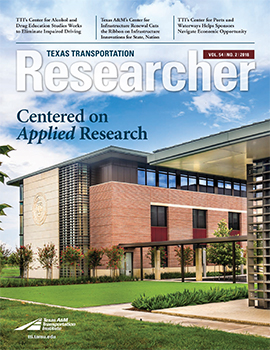The Texas Marine Transportation System includes 1,000 harbor channels; 25,000 miles of inland, intracoastal and coastal waterways; and 3,700 terminals handling passenger and cargo movements. And it connects with 152,000 miles of rail, 460,000 miles of pipelines, and 45,000 miles of interstate highways.

With 11 deepwater seaports as international gateways and more than 1,000 miles of inland waterways along the Gulf Coast, waterborne freight transportation plays a vital role in the Texas economy, accounting for more than 17 percent of the Lone Star State’s gross state product. That makes Texas one of the country’s largest maritime states.
Since 1995, the Texas A&M Transportation Institute’s (TTI’s) Center for Ports and Waterways (CPW) has benefited Texas and the nation by conducting applied research at the local, regional and national levels. Its proven track record of innovative research, technology transfer and implementation makes CPW a valuable resource for the maritime industry. From local issues in water transportation to infrastructure funding and the proper evaluation of project cost/benefit, CPW researchers have helped ensure the safety, efficiency and productivity of our nation’s maritime interests. Center professionals are thought leaders across multiple disciplines, including engineering and technology, environmental concerns, operations and logistics, planning and development, and trade and economics.
Maintaining a strong commitment to higher education and professional training, several CPW researchers hold joint teaching appointments and conduct specialized training programs. Additionally, graduate and undergraduate students actively participate in and make significant contributions to the center’s successful research program.
“Our wide-ranging expertise enables us to help [the Texas Department of Transportation (TxDOT)] and other sponsors assess the broader impact waterways have and how properly maintaining them can positively impact local economies,” explains TTI Research Scientist and CPW Director Jim Kruse. “From the cost of produce at the grocery store to the supply of refined products to encouraging a cleaner environment, Texas waterways are a vital factor in the economic equation.”
Selected CPW Projects
Analysis of the Effects of Lack of Channel Maintenance Dredging
This study analyzed the effects of losing 1 foot of draft from actual maintained channel depths, resulting in increased economic impacts. Researchers identified five categories of effects: light loading non-container vessels, partial discharge at Woodhouse Terminal, maneuvering stern first, daylight restrictions, and light loading container shipments.
Gulf Intracoastal Waterway Master Plan
This research established a baseline for the condition and use of the Gulf Intracoastal Waterway in Texas (GIWW-T). The study looked at what’s needed to restore and sustain the GIWW-T to its optimum level, major operational concerns, the impacts of operational obstacles (including a lack of dredging), and how TxDOT might be able to play a more active role in achieving a highly efficient and safe GIWW-T. This plan resulted in TxDOT partnering with the U.S. Army Corps of Engineers to identify solutions to problems posed by the current structures at the Brazos River Floodgates and the Colorado River Locks.
Preparation of Texas Strategic Maritime Plan
CPW experts identified knowledge gaps and potential research and development opportunities for TxDOT’s Maritime Division to consider in its planning activities. The prepared document served as a springboard for the development of a formal five-year research and development plan.
Analysis of Effects on Port Operations from the March 22, 2014, Incident in the Houston Ship Channel
At 12:35 p.m. on March 22, 2014, a collision occurred in the Houston Ship Channel, spilling approximately 4,000 barrels of bunker fuel into the bay. This incident could have shut down the Houston-Galveston port area for a lengthy period and caused serious local and national economic harm. Instead, the channel was closed for five days. CPW researchers identified the effects the closure had on oceangoing and barge traffic, assessed non-traffic effects on refineries and petrochemical plants, and investigated how local industry and regulators managed the event, as well as how Houston Ship Channel users perceived their handling.

